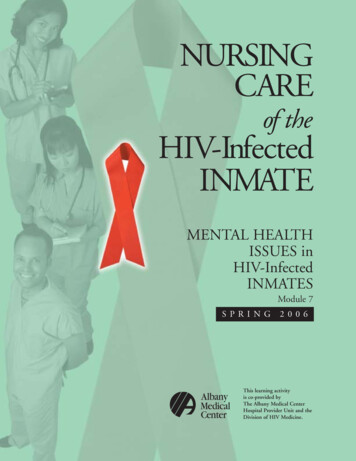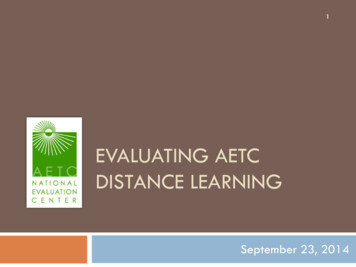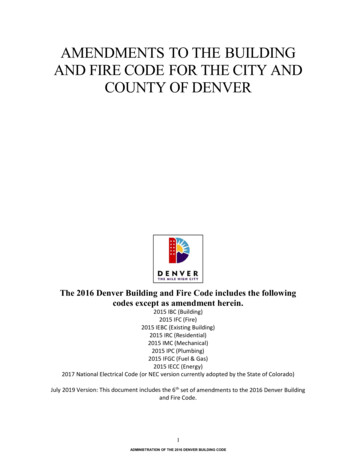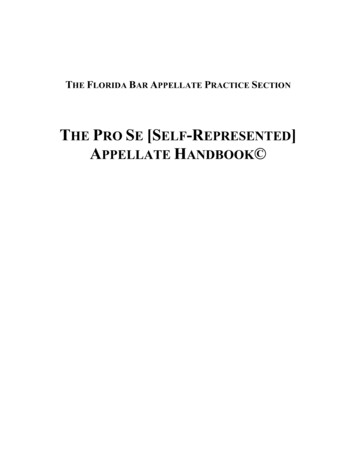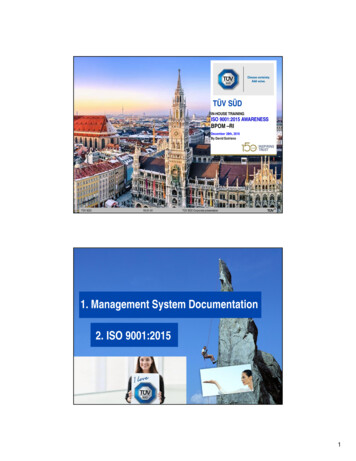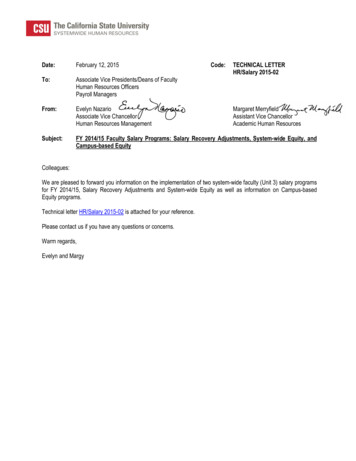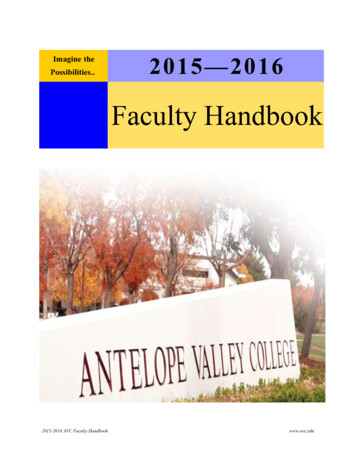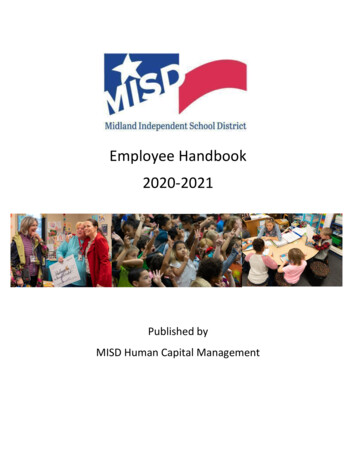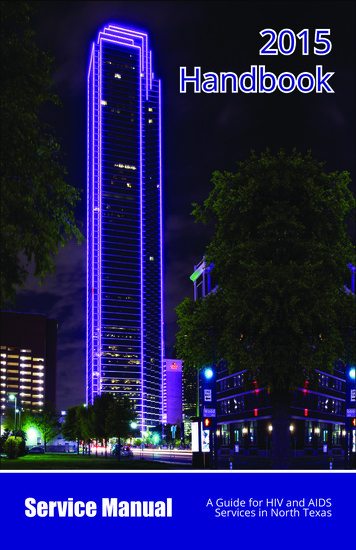
Transcription
2015HandbookService Manual1A Guide for HIV and AIDSServices in North Texas1
About Our Cover: On the evening of Sunday, March 29, 2015, the Omni Hotel,Hunt Consolidated, Bank of America Plaza, Reunion Tower and Bain & Co. turnedthe Dallas skyline “Parkland Purple” in honor of the dedication of the new DallasCounty Parkland Memorial Hospital that took place on March 30, 2015.
Table of ContentsSection I: A Guide to HIV/AIDS Services in North Texas.2Section II: Risk Reduction Message.3Section III: Important Resources.4Section IV: How to Use This Handbook.6Section V: Tips and Instructions.7Section VI: Getting Started .10Section VII: Services Listing .15Section VIII: Agency Listing.28Section IX: National Hotlines.57Section X: Comments & Corrections.58Referral Chart.59Medication Chart.62Laboratory Chart.64Notes.661
Section IA Guide to HIV/AIDS Services in North TexasJuly 2015The 2015 HIV Services Handbook has been designed to help you find servicesand organizations in Dallas County and surrounding areas. It’s not a directoryof every service available, and inclusion in this directory does not constitute anendorsement by the Dallas County, Texas Department of State Health Services, orParkland Health & Hospital System.The scope of this 17th edition of the Handbook has been redesigned to be moreuseful to you, the client. Handbooks in the past have primarily listed agenciesfirst, with a list of their services beneath each agency’s name. The 2015 Handbookhas been designed with services listed alphabetically, with the names of agenciesproviding the service and the page number where information about that agencycan be found.Agencies providing services in other areas of Texas and surrounding countieshave been included as a courtesy for all users of this informational Handbook ifthe agencies furnished information for publication.We have relied on the agencies listed to supply us with current and accurate information about their programs and services. If an agency did not respond to ourrequest for information, it may not be included in the Handbook. The Handbookis designed to provide a starting point for accessing services in the Dallas area. Inmany cases it is only a partial list of the kinds of programs, services, and agenciesavailable to someone living with HIV or AIDS in the Dallas area.We have made every effort to be accurate in our development of this Handbook.Please understand that services change, and what was true when this book waspublished may not be true just a few months later. We hope you will find thisHandbook useful. We welcome your comments and suggestions. Please contact:Parkland Health & Hospital System HIV Services Department1936 Amelia Court Dallas, TX 75235Phone: 214-590-5182 Fax: nd comments to HIV-Handbook@phhs.org2PDF versions of this Handbook can be found pital.com/HIVServices p
Section IIRisk Reduction MessageMyths persist about how HIV is transmitted. Only certain fluids: blood, semen,pre-seminal fluid, rectal fluids, vaginal fluids, and breast milk from an HIV-infected person can transmit HIV. These fluids must come in contact with a mucousmembrane or damaged tissue or be directly injected into the bloodstream (froma needle or syringe) for transmission to possibly occur. Mucous membranes canbe found inside the rectum, the vagina, the opening of the penis, and the mouth.An HIV infected woman can transmit HIV to her unborn child if she does not seektreatment in a timely manner.To decrease the risk of spreading HIV: Use condoms or dental dams during all sexual activity; Preferably, try to stop using street drugs, but definitely do not share druginjection equipment; If you are HIV positive and pregnant, talk with your health care providerabout taking HIV medications to help prevent HIV transmission to yourbaby; If you are an HIV-infected woman, don’t breastfeed any baby; Protect cuts, open sores, and your eyes and mouth from contact withblood and the other bodily fluids referenced above.IMPORTANTIf you think you have been exposed to HIV, get tested.Testing locations are listed in this Handbook.REMEMBERGetting tested now can lead to early detection of HIVwhich leads to early medical intervention.FOR EMERGENCIES CALL 911Crisis and Suicide Line (Dallas)214-828-1000 or 1-800-273-TALKRape Crisis & Child Sexual Abuse (Dallas)214-590-2926National Domestic Violence Hotline800-799-SAFE (7233) or800-787-3224 (TTY)Texas Abuse/Neglect HotlineFor reporting abuse, neglect, orexploitation of children, the elderly,or people with disabilities.800-252-5400 orhttps://www.txabusehotline.org3
Section III: Important ResourcesThis guide contains numerous resources, but the ones in this section are highlighted for the value of the service, and because they are new, under-utilized orgenerally unknown services. As with all listings in this Handbook, services andprograms change, and only the agencies themselves can tell you whether or notyou qualify for services.Affordable Care ActAssistance with the Health Insurance MarketplaceIf you are already a client of any Ryan White funded agency: Speak with acase manager. If you do not have a dedicated case manager, tell the receptionistthat you want to speak with someone about signing up for health insurance.If you are not a client of a Ryan White funded agency, or aren’t sure if youare: You can go to any federally qualified health center (FQHC) and ask to speakwith someone about signing up for the healthcare Marketplace. All FQHCs havestaff that is trained to assist anyone who needs assistance; you do not need tobe a patient at that clinic. For locations and contact information, please contactthe following:Dallas County Foremost Family Health Center – Balch Springs 972-588-4532 x100Los Barrios Unidos Community Clinic, Inc. 214-571-6132The Stewpot 214-746-2785The Bridge 214-670-1145Martin Luther King, Jr. Family Clinic 214-426-3645 x161Grand Prairie Community Health Center 469-865-1850Mission East Dallas and MetroPlex Project 972-682-8917Tarrant County Northside Community Health Center 817-625-4254Southeast Community Health Center 817-916-4333Denton County Health Services of North Texas (HSNT – 2 locations) 940-387-5788Collin County4 Collin County Adult Clinic 972-423-4941 Farmersville Family Medical Clinic 972-782-6131 Health Services of North Texas (HSNT – 2 locations) 972-801-9689
Link-Up 7This program assists low-income individuals with the cost of establishing homeor wireless phone services, and offer a discount based on monthly service. Applications for both programs can be made at the same time at the website ortelephone number above.LITE UP Texaswww.liteuptexas.org866-454-8387Under LITE UP Texas (Low Income Telephone and Electric Utilities Program),qualified low-income customers currently receiving Medicaid and food stampsor with a household income at or below 125% of the federal poverty level receivea discount off of their monthly electric bill.Qualified Medicare Beneficiary (QMB) & SpecifiedLow-income Medicare Beneficiary (SLMB) Programswww.yourtexasbenefits.com866-454-8387The QMB program is federally mandated coverage for Medicare beneficiarieswho have countable income of no more than 100% of the federal poverty leveland who have limited resources. The state pays Medicare Part A & B premiums,Medicare deductibles, and Medicare co-insurance costs. Individuals may be eligible for both Medicaid and QMB benefits.The SLMB program is a federally mandated coverage group that is an extensionof the QMB group. Under this program individuals are entitled only to the payment for Medicare Part B premium. Income must be more than 100% but lessthan 120% of the federal poverty level.5
Section IVHow to Use This HandbookFinding Services and Service ProvidersPageSection V: Tips and Instructions7Section VI: Getting Started10Section VII: Service Listing15Section VIII: Agency Listing28General InformationSection IX: National Hotlines/Online Information57Section X: Comments/Corrections58Helpful Medical Charts & Notes Section59To Find ServicesIf you need a specific type of service, turn to Section VII starting on page 15 foran alphabetical list of services with the agencies providing them listed beneath.To Find an Agency or OrganizationIf you are looking for an agency by name, turn to Section VIII starting on page 28for a listing of agencies and a description about each.About Ryan White and The Ryan White ProgramThe Ryan White HIV/AIDS Program provides HIV-related services in the UnitedStates for those who do not have sufficient health care coverage or financial resources for coping with HIV disease. The program fills gaps in care not met byother payers.Ryan White was diagnosed with AIDS at age 13. He and his mother Jeanne WhiteGinder fought for his right to attend school, gaining international attention as avoice of reason about HIV/AIDS. At the age of 18, Ryan White died on April 8, 1990,just months before Congress passed the AIDS bill that bears his name – the RyanWhite CARE (Comprehensive AIDS Resources Emergency) Act. The legislation hasbeen reauthorized four times since – in 1996, 2000, 2006, and 2009 – and is nowcalled the Ryan White HIV/AIDS Program.About Housing Opportunities for Persons with AIDS(HOPWA)The HOPWA program is a federally-funded grant program that provides housing assistance and supportive services for persons living with HIV/AIDS and theirfamilies. HOPWA was established by the National Affordable Housing Act of 1990.HOPWA has helped countless persons managing their HIV infection to avoidhomelessness by addressing their needs for housing and access to medical andother care.6
Section VTips and InstructionsEstablishing your Eligibility: Each of the agencies and services listed in this Handbook has specific, and sometimes slightly different, eligibility requirements. Different requirements might include things like your health status, where you live,or how much money you make. Read through the “Getting Started” section of thisguide to get a better understanding of the help that is available and how to accessservices.What to Carry Around With You: If you are new to care or returning to care, onthe day you go out to seek new services, the following items may be very helpful tohave with you in order to speed up the eligibility process:1.2.3.4.Proof that you are HIV positive;Proof of where you live;Proof of your income; andProof of your insurance statusIMPORTANT: Talk to the staff at whichever agency you visit to find out exactlywhat documents will be helpful to have when you go for your appointment. Proof of HIV/AIDS Diagnosis must be verified by one of the following:oooo A lab report of detectable HIV “viral load” that includes the nameof the client and the testing facility;A signed statement from a physician, physician’s assistant, anadvanced practice nurse or a registered nurse (RN) attesting tothe HIV positive status of the person;A hospital discharge summary that documents HIV positive status and includes the name of the client; orA confirmatory HIV laboratory result (Western Blot, IFA, NAAT,Multispot HIV-1/HIV-2 Rapid Test [Bio-Rad)] or a detectable HIVRNA) that includes the name of the client and the testing facility.Proof of residency within the Dallas EMA/HSDA and/or Sherman/Denison HSDA is required and must be verified by one of the following in the client’s name:oooooA valid Texas driver’s license or Texas state identification card,with an address within a specified service delivery area;A current Voter Registration Card;Mortgage or lease agreement with a Texas address within aspecified service delivery area, as it relates to the standard Texas Apartment Association (TAA) lease. The first and last page ofan executed lease is acceptable, provided all required information is included within these two pages. As for non-TAA leases,the lease must be reviewed thoroughly to determine if the firstand last pages have sufficient information to satisfy eligibilityrequirements;A receipt or documentation from the landlord, dated within thelast thirty (30) days, indicating residence or month-to-month lease;One household bill with the client’s name and address (including residential or cell phone bill) delivered within the last thirty(30) days;7
o A signed statement dated within the last thirty (30) days, fromthe client indicating homelessness or non-traditional habitation outside the boundaries of a physical address, institution,or homeless shelter;oRelease paperwork from a correctional facility documentinga local address within the Dallas EMA/HSDA and/or Sherman/Denison HSDA;oOne article of personal mail with the client’s name and address,postmarked within the last thirty (30) days;oOne article of business or bulk mail, with the client’s name andaddress, delivered in the last thirty (30) days; a postmarkedenvelope is not required if the correspondence includes thebusiness name, date sent, and the client’s name and address;oPay stubs dated within the last thirty (30) days; oroA signed statement from a person in the household, datedwithin the last thirty (30) days verifying that the client lives at aspecific address.Proof of Income must require any one of the following for eachsource of income:o 8Award letter (including, but not limited to: SSI, RSDI, VA, andPension) granting benefits for the current calendar year;oPayroll check stubs to verify the last thirty (30) days of income;;oMost recent bank statement that shows deposit and sourcewithin the last thirty (30) days; this may include electronic bankstatements obtained online from the banking institution;o“No Income Certification” form signed by the client within thirty(30) days of intake;oFinancial support within the last thirty (30) days including cashpayment and assistance from family must be documentedwith the benefactor, verbally or in writing;oLetter or verbal communication within the last thirty (30) daysfrom an employer verifying frequency of payment and amountof wages or salary;oChild support statements;oAlimony statements;oSigned statement from the client indicating that they receivecash payments for labor performed; oroMost recent W-2 Form or U.S. Tax return.Verification of Health Insurance Coverage; Medicaid/Medicare, orThird party Eligibility Verification: Many programs that you will beaccessing, including Ryan White Program services, require that their resources (funding) be used as the “payer of last resort”. That means thatthe agency has to verify that there is no other resource available to cover payment for your services before they can use Ryan White or otherfunding to do so. Not all services require insurance verification. Below isa list of the services that may require it:oooooooPrimary Medical Care (doctor visits/labs, etc.);Psychiatry Services;Pharmacy Assistance Programs;Oral Health Services;Substance Abuse Treatment Services;Vision Services;Transportation Services (Medicaid only);
ooCase Management (for children up to 20 years of age and pregnant women only);Acceptable documentation to verify Medicaid/Medicare or thirdparty eligibility status may include:§Client self-attestation (acceptable at every 6 month reassessment) of no change or self-attestation of changewith acceptable documentation from the list below;§Medicare/Medicaid or other insurance rejection letters;§Current verification of employment, i.e. payroll stub,copy of payroll check, bank statement showing directpayroll deposit, letter from employer on company letterhead indicating weekly or monthly wages no greaterthan 6 months old (to demonstrate Medicaid/Medicareor third party eligibility status);§Medifax slips or other automated system (must be doneat least monthly)§The following documentation is acceptable only for undocumented and/or homeless clients: Letter on company letterhead from a case manager, social worker, counselor, or other professional(certifying Medicaid/Medicare or third party eligibility status) from another agency who has provided services to the client, stating that the client isundocumented and/or homeless.REMEMBER: Call ahead to the agency you will be visiting and ask what you’ll needto bring when you go for your first appointment. Once you have gathered youreligibility documents, keep them with you for each agency you visit. Some agencies may work with one another and do a central intake, which means once yougo through the process at one site it’s valid for all sites affiliated with that agency.However, many agencies are stand-alone businesses, and you may have to repeatthe eligibility process at each site. Try not to get frustrated by the paperwork – youmay find that the process goes smoothly if you stay organized and keep your documents with you while establishing yourself in services.Be aware that information changes frequently. Since the 2014 Handbook was released, several agencies either added or stopped offering services previously available, and two agencies went out of business. Always call the agency first to verifyinformation.There are times when individuals do not have all of the information listed. If thisis your situation, call and talk to an intake specialist. They often can offer helpfuladvice on how to collect needed information or offer alternatives not listed in thisHandbook.9
Section VIGetting StartedJust Recently Diagnosed or Returning to Care?Receiving an HIV diagnosis is an overwhelming and often frightening experience.Where do you go? Who do you call? What should you do next? There are choicesto consider, but the important thing is not to panic. This Handbook is full of options for you, and behind each option is a team of caring professionals who aregoing to guide you through maintaining your health and accessing all the servicesyou may need in order to deal with the physical and psychological implications ofan HIV diagnosis.Reasons to Enter or Re-Enter Primary Medical CareIn order to guide you through the options that are now a part of your life, thereshould be someone who understands how all parts of your care fit together tokeep you as healthy as possible. That person will typically be your primary careprovider (PCP). PCPs are responsible for providing health maintenance care andcoordinating care among other specialties. The PCP may be a doctor (MD or DO),nurse practitioner (NP), or physician’s assistant (PA). It is best if you and yourhealth care provider work together as a team and that you play an active role inunderstanding your healthcare needs and HIV disease.Additionally, in order to keep you as healthy as possible, it is important for a clinician to run laboratory testing to find out what HIV disease stage you are in andwhat treatment options are available to you. While some people may feel theyneed to take a breath after an HIV diagnosis and therefore wait to seek medicalattention, it is strongly advised that as soon as you are diagnosed, you make anappointment to be seen by a doctor to get yourself established in care. Save taking that breath for when you have the facts so you don’t scare yourself with whatyou don’t know.Who Do I Call First?To connect or reconnect to the HIV/AIDS care system, simply call one of the organizations listed in pages 28 - 56 that has “RW” (Ryan White) beside the agencyname. Each Ryan White organization can either provide you with Intake services,or connect you to an agency that can.For help in counties beyond Dallas, one of the following organizations can helpyou:Ellis & Navarro CountiesAIDS Arms, Inc.10214-521-5191 or 866-495-3400Denton, Collin, Hunt, Kaufman, Rockwall CountiesHealth Services of North Texas800-974-2437Ector CountyBasin Assistance Services432-498-4141El Paso CountyCity of El Paso/HIV Prevention Program915-212-6665
Cooke, Fannin & Grayson CountiesCallie Clinic903-891-1972Harris CountyAIDS Foundation Houston713-623-6796Lubbock CountyCommunity Action Health Access Multi Program Service“Project CHAMPS”806-771-0736Midland CountyMidland Odessa Area AIDS Support432-684-7821Nueces CountyCoastal Bend Wellness Foundation361-814-2001Potter CountyPanhandle AIDS Support Organization806-372-1050Tarrant & Parker CountiesAIDS Outreach Center of Fort Worth817-335-1994Taylor CountyBig Country AIDS Resources325-672-3077Travis CountyAIDS Services of Austin “ASA”512-458-2437What is an Intake Session?Your intake session is your first introduction to what is available in the communityto help you take care of your health and begin to plan for the future. Intake sessions are scheduled for the first available appointment, although appointmentsfor urgent situations can be scheduled sooner. Every effort will be made to locatean intake site convenient to you. Home visits are available from most intake siteswhen illness or transportation problems exist.There are many services available that, based on certain eligibility criteria such asincome, could be free of charge to you. These services are funded at many agencies by the Ryan White HIV/AIDS Treatment Extension Act (RWTEA) of 2009 and areknown locally as “Ryan White Program” services (RWP). Not all of the agencies orservices in this book are funded by the RWP, but they are available to you based onyour eligibility criteria. These services include medical and dental care, case management, medication assistance, insurance assistance, HIV education, transportation, mental health counseling, food pantry, legal services, child care, housing,substance abuse treatment and home health services.Eligibility Certification: All HIV individuals who seek care, support and resources from RWP providers must complete an intake session. Intake sessions involveproviding important information about yourself so needs/eligibility assessmentsmay be determined. There will be forms to fill out, information and documentsto provide to an intake specialist (such as those described on pages 5 – 8), and anin-depth discussion about how help can be provided to you to help you effectivelymanage living with HIV/AIDS now and in the future.11
Once you arrive for your intake session, the intake specialist will fill out a Common Intake Form (CIF) and several other forms that ask many questions. Thesequestions are not meant to intrude on your privacy! They are meant to providecritical information on how best to serve your needs and ensure you understandyour diagnosis and the HIV care system. It is good to know that many serviceorganizations require additional paperwork from you beyond the Common Intake Form when you arrive for your first appointment, such as consent to receiveservices forms.Once your eligibility has been certified and you have completed the process, yourdocuments and information remain valid for six months from the date of intake.After six months, you will need to update any information that has changed withnew documents.IMPORTANTIt is vital that you keep your appointments for recertification of eligibility. Ifyou fail to keep your appointment, your eligibility will expire, and a full newintake will be required again before you can return to services.How Long Does an Intake Session Take?You should make plans to spend several hours to complete your intake sessionto allow the intake specialist the time needed to complete required paperwork,explain the HIV care system, offer information about HIV, the importance of ongoing health care and provide referrals to needed care and resources.Can I Bring Someone With Me?Absolutely! It is important that your loved ones be involved in your care and support. We welcome them at the intake session. We can help them better understand HIV and become a stronger support system for you. There may also be services we can offer them as affected family members such as counseling or childcare for your children. In addition, we have access to many other non-HIV relatedservices in the community that may be very helpful for caregivers, partners andfamily members.What Happens to My Information?Information provided at the intake session is collected and entered into aTexas Department of State Health Services (DSHS) database called ARIES. ARIESinformation is secure and confidential in order to protect your privacy. It is usedto track the HIV epidemic, the needs of the people impacted by the disease andthe services utilized by them. All Ryan White funded organizations are requiredto enter this information and maintain strict confidentiality of the informationprovided to us. Only you can provide permission for us to share that informationwith other providers.You will be provided a copy of all forms completed during intake. It is importantthat you take this packet with you to your first appointment at other referral service organizations. We will also, with your permission, share needed informationwith these referral service organizations to help expedite the referral process soyou can begin needed services as quickly as possible.12
The Benefits of Case Management and Care CoordinationYour intake specialist will discuss the benefits of case management and how it canassist your long-term efforts to manage your health, offer support as you and yourloved ones adjust to your diagnosis, and help link you to future services you mayneed, such as legal and counseling services, Social Security, Medicaid, Medicare,Medicare Part D and many other community resources. Case managers are specially trained to respond to the needs of HIV people and help plan for long termfinancial, emotional and physical needs. They can be your advocate and guide toaccessing important services, support, education and health care.Case management is free to any HIV person regardless of income.How do I Connect to Case Management?It is easy to get linked to this service. The intake specialist will assess your needsand provide an opinion about your need for case management; however, casemanagement is available to any HIV person upon request. Once you request theservice, the intake specialist will help you choose the best site to meet your uniqueneeds. You will be referred immediately and a case manager will call you for a firstappointment. They will provide additional assessment and begin a comprehensivecare plan that focuses on reaching optimal quality within your medical, financialand emotional life. Ongoing referrals will be provided to ensure you remain linkedto medical care.HIV education, treatment adherence planning, home visits, family/partner education and testing, and support groups are just some of the additional supportavailable to you in addition to the wide range of services throughout the NorthTexas area. Home visits are available at several of the case management sites andbilingual services are available at most for Spanish, French and American Sign Language.You should ask about the availability and the criteria for case management homevisits when you contact one of the listed sites.What if I Don’t Want Case Management?Not a problem. Not everyone needs ongoing case management and some peopleonly need intermittent assistance. If you do not want or need future referrals beyond the intake session, you are not required to accept case management. If youshould need future referrals, you will require a case manager to assist you. Simplycall your original intake site and let them know your needs. They will link you with acase manager as soon as possible in an area that’s most convenient to you. We arehere to help! If you are HIV and need assistance, please call us. We stand readyto guide you through a complex care system with the best possible impact on yourhealth, stability and well-being.What Happens Next?Once the intake specialist completes the required paperwork and assessment foreligibility and needs, he or she will provide you with immediate referrals to needed medical care and supportive services. They will inform you on how to make anappointment and what additional paperwork you may need that is unique to eachservice organization. They will also provide you a referral form for all referred services you need at that time and educate you on how case management can helpyou access additional services you may need in the future. Although intake specialists can provide initial referrals at the time of your intake, only a case manager13
can provide referrals after the intake process is completed. It is therefore veryimportant to consider case management as a potential service you may need inthe future.Once your intake is complete and you receive your intake packet and referralform, you simply call the referred organizations for a first appointment. Be sureto ask if there is additional information you need to bring beyond the intake packet provided to you. Your intake specialist can help you make these appointmentsif you choose.What Else?2-1-1 is a free, easy-to-remember phone number connecting callers with healthand human services in their community. When you dial
Low-income Medicare Beneficiary (SLMB) Programs www.yourtexasbenefits.com 866-454-8387 The QMB program is federally mandated coverage for Medicare beneficiaries who have countable income of no more than 100% of the federal poverty level and who have limited resources. The state pays Medicare Part A & B premiums,
